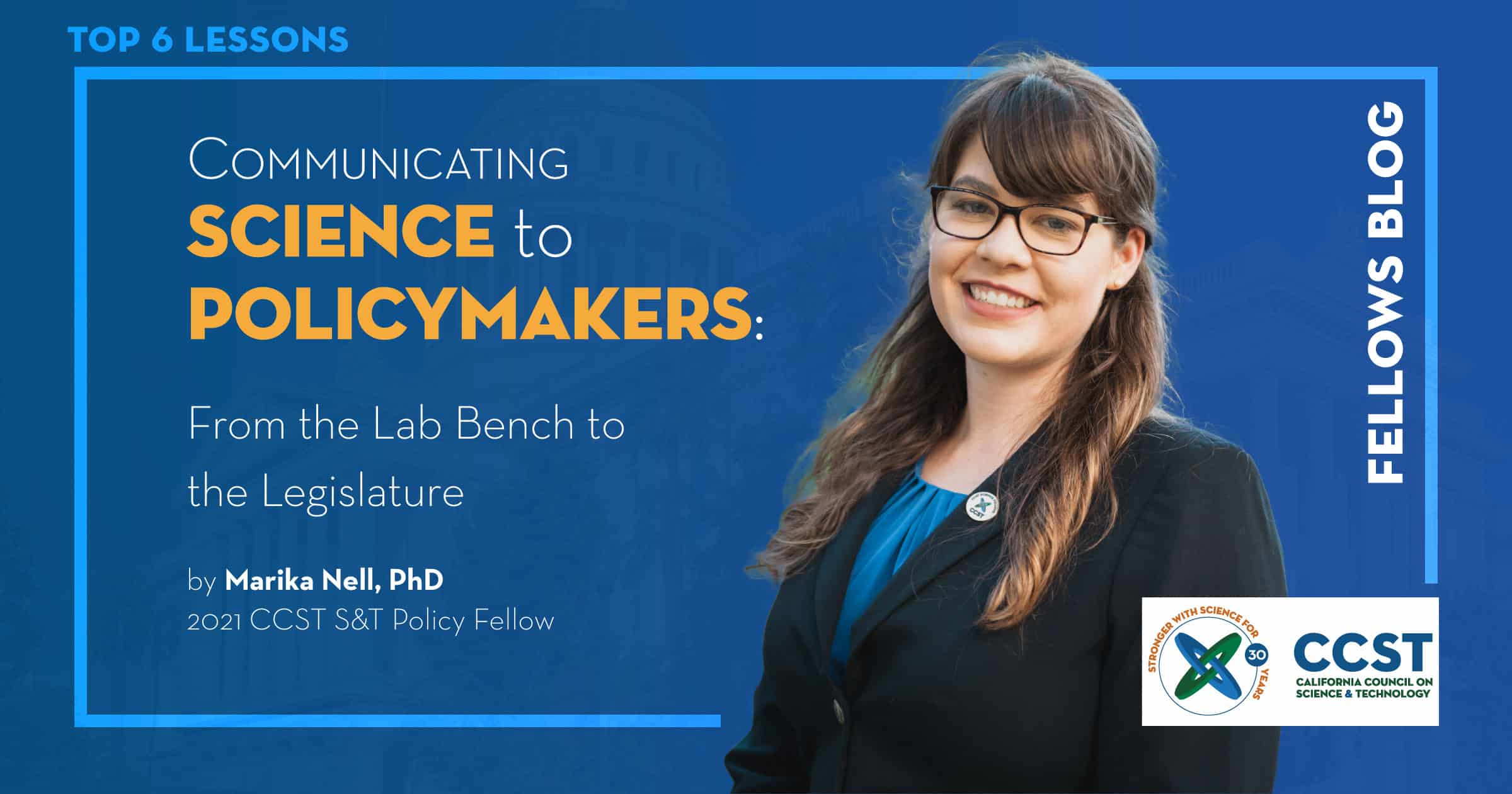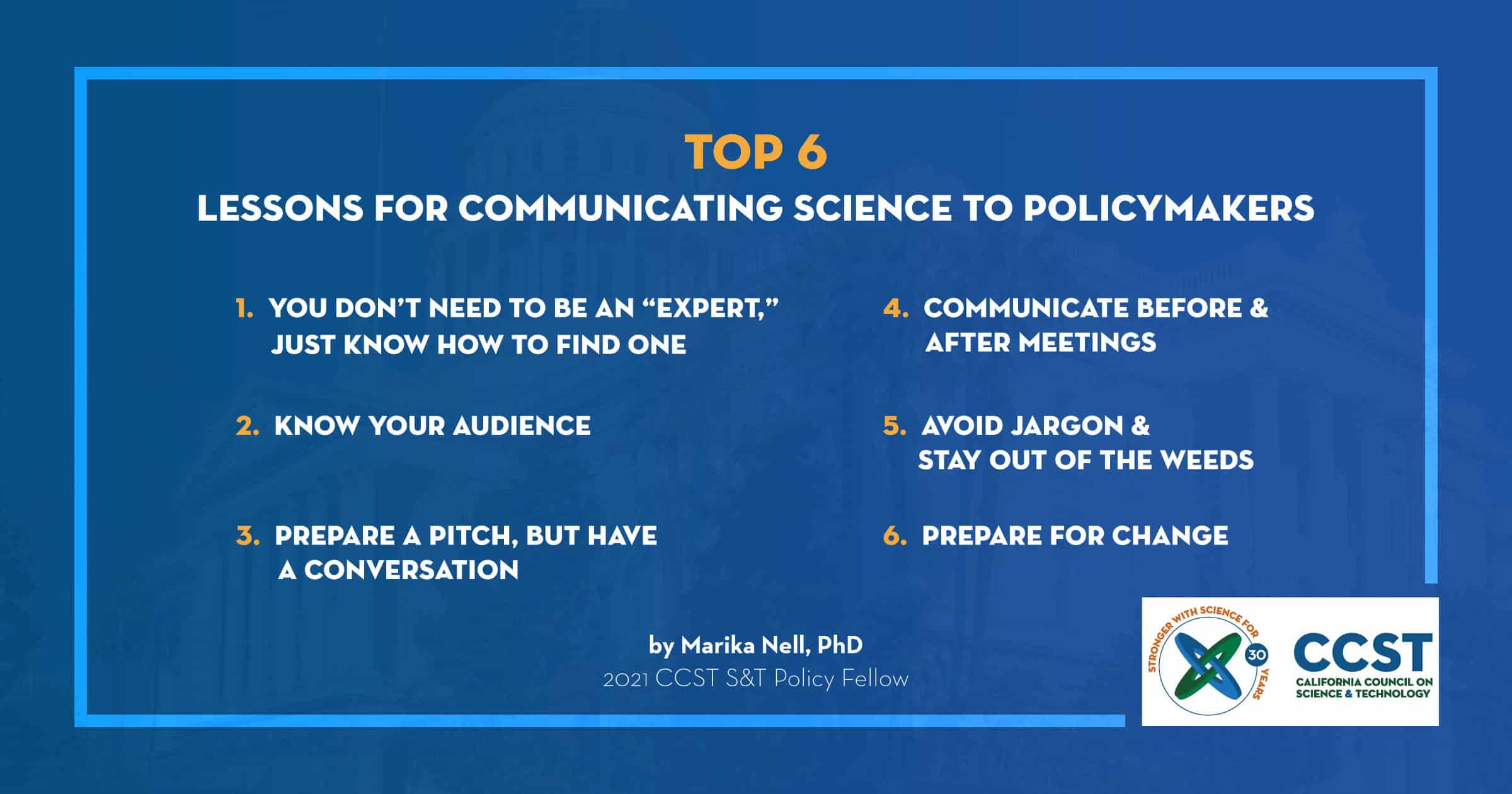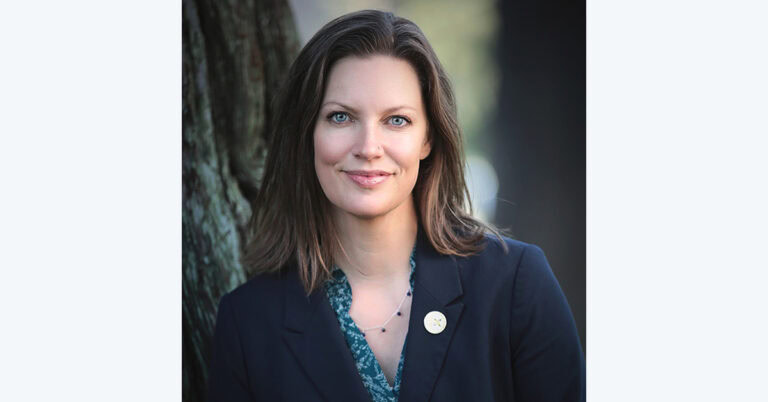Deputy Director
Communicating Science to Policymakers: From the Lab Bench to the Legislature
September 30, 2021 | CCST Newsroom, CCST S&T Policy Fellows

Marika Nell is a 2021 CCST Science & Technology Policy Fellow placed with the Assembly Committee on Environmental Safety & Toxic Materials. Originally from Maryland, Marika earned a PhD in Civil & Environmental Engineering from Cornell University. In her research, she studied the water quality impacts of fracking operations by searching for known and unknown fracking chemicals in water and wastewater. She has communicated her research findings to a broad range of audiences including elementary school students, academic experts, and state and federal policymakers. She also holds a B.S. in Civil Engineering with a minor in Environmental Economics and Law from the University of Illinois Urbana-Champaign.
During my PhD research in civil and environmental engineering, I studied fracking (a.k.a. hydraulic fracturing)—a topic that inspires very strong feelings but is also very technically and politically complex to communicate. Specifically, I studied the water quality impacts of fracking operations.

Over the years, I found that although people had strong opinions about fracking, there were also common misunderstandings about how fracking technically works and the risks of chemical contamination. I pursued science communication so that I could share my work with a broad range of audiences and learn more about diverse perspectives on fracking and other complex issues.
I also needed to gain a better overall understanding of the environmental and energy policy landscape, so I started participating in my university’s advocacy days. These days presented exciting opportunities to share my work with policymakers, but they were also nerve-wracking and challenging. Meetings changed as legislators’ schedules shifted, group size (and time available for my pitch) varied, and interest in the topic depended on the office. But these meetings offered the chance to start a conversation and build a relationship.

In these meetings, I was able to learn more about the challenges of working in a legislative environment, the policy considerations of legislators and staff, and the importance of engaging stakeholders with a broad range of perspectives when crafting policy. They inspired me to pursue a career in policy to ensure that science and engineering perspectives were included.

Now, as a CCST Science and Technology (S&T) Policy Fellow working in the California State Assembly, I am on the other side of policy meetings that cover environmental, transportation and health issues. As the person receiving the information, I have learned a lot about how I could have improved my pitches and meeting preparation to communicate with policymakers and legislative staff more effectively.
Here are my top takeaways so that you can better use your science communication skills in a policy setting:

1. You don’t have to be an academic “expert” to speak about a scientific issue.
Academia has a high bar for who may be considered an expert. However, graduate school teaches us the analytical skills to find reliable, complex research and—crucially—distill it down into the key points. In a legislative context, you can lend a scientific perspective to issues that impact your field or that impact you personally. And when you need an expert? You know how to find one.
2. Know your audience.
The legislative world is full of people with varied career paths. When discussing a technical issue, you could be talking to someone who has never heard about it or someone who has been steeped in it for years. Research the person you will be in contact with and tailor your pitch appropriately. If you do not know in advance, ask if the legislator or legislative staff are familiar with a topic at the beginning of a conversation.
Be sure to include why your issue matters to the legislator or their office. What are the broader impacts of the issue? Does it impact the district of the legislator or legislative staffer that you are meeting with? Does this issue line up with past legislation or areas of interest for the legislator?
3. Prepare a brief pitch but think of the meeting as a conversation.
Meeting time is valuable. Preparing a brief pitch that covers the basics of your issue, why it matters, and what you want the legislator to do with that information is a good way to start the meeting. However, the value of having a meeting as opposed to sending an email is the ability for both sides to ask questions and exchange information. If you bring up your issue and the legislator/staff give you an indication that they support/oppose it, use this information to adapt your pitch and find out more about their experience and stance on the issue.
4. Communicate with the legislative office before and after your visit.
Conversations are most productive if everyone involved has the chance to prepare (or at least determine if they need to prepare). When you request the meeting, make sure to tell the office what issues or legislation you are planning to discuss. If you have materials that summarize the issue or a list of attendees, provide them at least 24 hours before the meeting to give staff time to look over them. This is particularly true when you intend to discuss issues that could be controversial in the office. If you surprise someone with a highly charged issue, they are more likely to default to a defensive or cautious response that prevents having a productive exchange of ideas. After your visit, be sure to follow up with a quick thank you and any resources that came up in the conversation.
5. Avoid jargon and do not get lost in the weeds.
Legislators and legislative staffers are juggling many issues, bills, and more at the same time. Remember that they may not be familiar with scientific jargon and keep the conversation on message. Focus your pitch on the big picture and let the questions drive how detailed the conversation becomes. If you do get into a conversation about the more detailed science, the most relevant information will probably be higher-level, well-established science—results that would appear in broad government reports or high-level review papers.
6. Do your best to prepare but know that everything can change.
Do not worry if your meeting schedule changes! Legislative schedules change all the time, so if your meeting is rescheduled, shortened, or you meet with staff instead of the elected official, it is nothing personal. It is also possible that your meeting time may happen after a bill you are supporting/opposing has come up for a vote or died. That is ok! No one expects you to be an expert in what is going on in the legislature and you can use this as a chance to find out more about the process.
At the end of the day, engaging with legislative offices is a great way to share information about important issues, find out more about legislative solutions to problems, and work to promote science-driven policy. As a CCST S&T Policy Fellow, I have learned a lot from being on the other side of the table. With preparation, you can act as a valuable resource to policymakers and their staff and become a better advocate for science with each meeting.
About the CCST Science & Technology Policy Fellowship
The CCST Science & Technology Policy Fellows program trains scientific thinkers to be policy-savvy, while helping equip California’s decision makers with science-savvy staff. The program was established in 2009 with funds from the Gordon and Betty Moore Foundation and other generous friends. Discover how our CCST Science Fellows make a difference in California’s policy arena at ccst.us/ccst-science-fellows-program.




